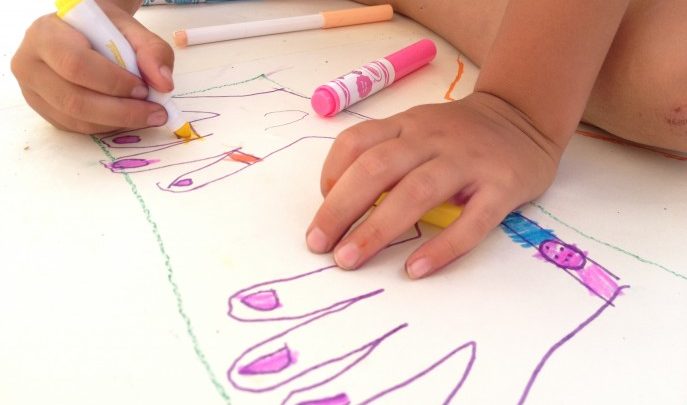Fun Activities To Encourage Fine Motor Control And Increase Confidence With Early Writing

Why is mark making important for the development of writing? How can we help young children enjoy it? Teachwire interviewed early language and learning specialist Michael Jones to find the answers

Teachwire: What is mark making? Michael: It’s a term used to describe how young children make marks on different surfaces, including paper. It eventually leads to letter and number formation – ie what we call handwriting.
How does mark making begin? Babies begin mark making accidentally and randomly. For example they might smear their food on their high-chair tray. Gradually it becomes something they do on purpose, like putting hand marks on the walls!
So how can we encourage children to make marks elsewhere, including on paper? Children copy what they see older children and adults doing. If we have a big piece of paper and start doodling, children will copy. If they see older children, eg their brothers and sisters, drawing and writing, they will want to do the same. If we talk about what they are doing, then children learn the words to talk about mark making; including shapes and patterns.
In this way, they gradually learn to make shapes; eg lines, crosses and circles, and patterns such as zigzags. As they grow physically, children become more able to hold and use various tools for painting, drawing and writing. Gradually, they understand that certain marks we make are called ‘writing’ and begin to experiment with writing recognisable letters, words and numbers in the language that they are being brought up in.
Do we need to teach mark making? Many of the skills involved in mark making need to be taught, and particularly writing letter shapes and numbers. But if children take part in activities that are meaningful and fun, they will want to be involved in them again and again. This helps them increase and improve their physical skills and understanding of what writing is for.
What can adults do to help? How adults talk with children when they are mark making is just as important as what the children actually do.
For example, adults might say, “That’s a lovely painting. I can see a circle there,” or “I like your drawing of lots of people. Is one of them you?” or “What are you writing? Oh, it’s your name! Of course it is! I can see you have written T for ‘Tom’ lots of times”.
These types of comments and responses give children the vocabulary to describe what they are doing, as well as confidence as mark makers and early writers.
Should we be encouraging children to hold a pen or pencil ‘properly’? By the time children are seven years old, they have usually reached the stage where they can automatically use a pencil correctly. But before they do that, there are lots of other things to learn.
Throughout the early years and first years of school, children are developing strength and control of gross motor movements and fine motor movements. They also develop hand-eye coordination, where they are able to look at something, reach out and hold it and watch what they are doing.
Very young children, between 18 months and three years, may not have the strength or control to hold a small pencil, or to be able to keep their shoulders or wrists steady, so you will see them grasp a chunky crayon in their fist and make big, whole arm movements.
For this reason it is important to match the right type of mark making tool to the child’s particular stage of physical development; eg giving thick, chunky crayons to younger children and thin pencils as well for those who are older. Developing children’s upper body strength and control, including in their shoulders and arms, is essential for mark making and early writing.
So we need to make sure that children are confident with fine and gross motor skills? Exactly. By doing that, and by having lots of mark making activities, children find out what is most comfortable for them when they come to hold a pen. In their first years in school, teachers and parents can work together to help them use the British accepted way of holding a pen.
But, just take a look at how your colleagues write with a pen. You will see that there are many variations. What is most important is that the children eventually hold a pen in a way that is comfortable for them, so that we can read what they have written.
It is often said that boys are more likely to have difficulties than girls when it comes to mark making and writing. Is there any evidence to support that? There are plenty of individual differences between children. From my experience, there are many little boys who have excellent fine motor skills from a very young age, and some who take more time to ‘get to grips’ with fine motor activities. This can have an impact on their confidence with drawing and early writing, so they spend more time outdoors or developing their gross motor skills.
Many girls may develop their fine motor skills at an early age and therefore enjoy holding a pen and making small marks. As a result they get more praise and experience than those children who are less confident.
One thing I would say is that experience and practice and praise for getting involved ion mark making are crucial for early writing.
Do you have a message for teachers of older children who seem to be finding early writing difficult? Check that the children are comfortable with their fine motor skills. If not, get them involved in lots of activities that build their confidence and skills. If the children are worried because they ‘can’t write their name’, they may have been started on this too early. Talk with the parents about positive things that they can do to help fine motor skills at home; eg playing with Lego and small wooden blocks and puzzles, cutting and sticking and drawing.
If they want to concentrate on writing, and you feel this is appropriate for the child’s age and stage, then help them to use the orientation of letters and numbers that will be used in school.
Finally, how can we help parents to support what we are doing in our settings? An important first step is to organise a workshop for parents, where you show them the activities that you use to help children with fine motor skills, mark making and early writing. This often leads to parents becoming involved in ongoing discussions with you.
For more free practical information about early language development and learning visit talk4meaning.co.uk
On Your Marks! A practical guide to mark making, early writing and language by Michael Jones is published by Lawrence Educational. Visit lawrenceeducational.co.uk for details.











